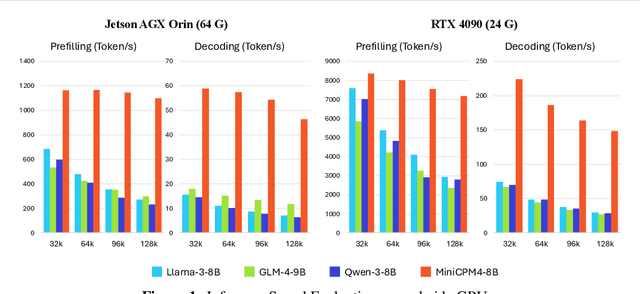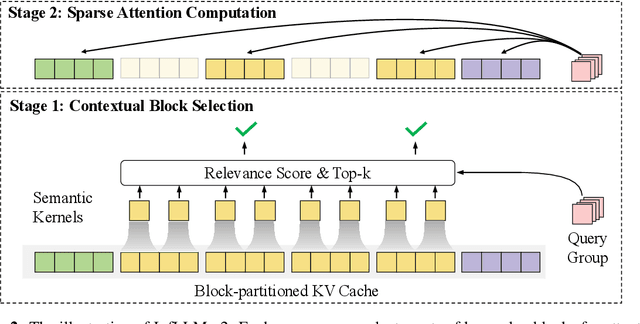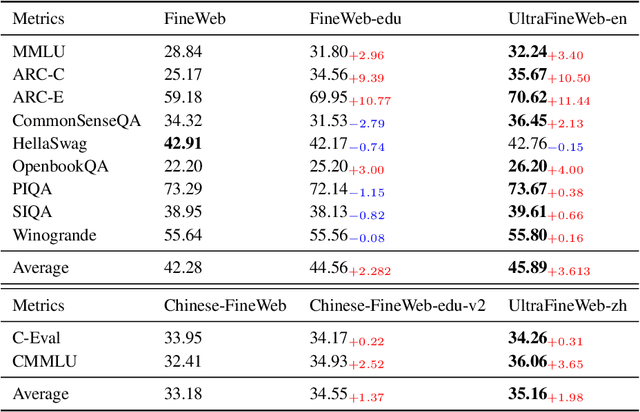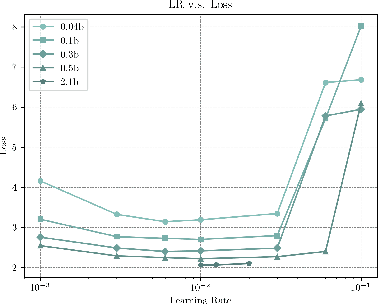Kaihuo Zhang
MiniCPM4: Ultra-Efficient LLMs on End Devices
Jun 09, 2025



Abstract:This paper introduces MiniCPM4, a highly efficient large language model (LLM) designed explicitly for end-side devices. We achieve this efficiency through systematic innovation in four key dimensions: model architecture, training data, training algorithms, and inference systems. Specifically, in terms of model architecture, we propose InfLLM v2, a trainable sparse attention mechanism that accelerates both prefilling and decoding phases for long-context processing. Regarding training data, we propose UltraClean, an efficient and accurate pre-training data filtering and generation strategy, and UltraChat v2, a comprehensive supervised fine-tuning dataset. These datasets enable satisfactory model performance to be achieved using just 8 trillion training tokens. Regarding training algorithms, we propose ModelTunnel v2 for efficient pre-training strategy search, and improve existing post-training methods by introducing chunk-wise rollout for load-balanced reinforcement learning and data-efficient tenary LLM, BitCPM. Regarding inference systems, we propose CPM.cu that integrates sparse attention, model quantization, and speculative sampling to achieve efficient prefilling and decoding. To meet diverse on-device requirements, MiniCPM4 is available in two versions, with 0.5B and 8B parameters, respectively. Sufficient evaluation results show that MiniCPM4 outperforms open-source models of similar size across multiple benchmarks, highlighting both its efficiency and effectiveness. Notably, MiniCPM4-8B demonstrates significant speed improvements over Qwen3-8B when processing long sequences. Through further adaptation, MiniCPM4 successfully powers diverse applications, including trustworthy survey generation and tool use with model context protocol, clearly showcasing its broad usability.
FR-Spec: Accelerating Large-Vocabulary Language Models via Frequency-Ranked Speculative Sampling
Feb 20, 2025Abstract:Speculative sampling has emerged as an important technique for accelerating the auto-regressive generation process of large language models (LLMs) by utilizing a draft-then-verify mechanism to produce multiple tokens per forward pass. While state-of-the-art speculative sampling methods use only a single layer and a language modeling (LM) head as the draft model to achieve impressive layer compression, their efficiency gains are substantially reduced for large-vocabulary LLMs, such as Llama-3-8B with a vocabulary of 128k tokens. To address this, we present FR-Spec, a frequency-ranked speculative sampling framework that optimizes draft candidate selection through vocabulary space compression. By constraining the draft search to a frequency-prioritized token subset, our method reduces LM Head computation overhead by 75% while ensuring the equivalence of the final output distribution. Experiments across multiple datasets demonstrate an average of 1.12$\times$ speedup over the state-of-the-art speculative sampling method EAGLE-2.
MiniCPM: Unveiling the Potential of Small Language Models with Scalable Training Strategies
Apr 09, 2024



Abstract:The burgeoning interest in developing Large Language Models (LLMs) with up to trillion parameters has been met with concerns regarding resource efficiency and practical expense, particularly given the immense cost of experimentation. This scenario underscores the importance of exploring the potential of Small Language Models (SLMs) as a resource-efficient alternative. In this context, we introduce MiniCPM, specifically the 1.2B and 2.4B non-embedding parameter variants, not only excel in their respective categories but also demonstrate capabilities on par with 7B-13B LLMs. While focusing on SLMs, our approach exhibits scalability in both model and data dimensions for future LLM research. Regarding model scaling, we employ extensive model wind tunnel experiments for stable and optimal scaling. For data scaling, we introduce a Warmup-Stable-Decay (WSD) learning rate scheduler (LRS), conducive to continuous training and domain adaptation. We present an in-depth analysis of the intriguing training dynamics that occurred in the WSD LRS. With WSD LRS, we are now able to efficiently study data-model scaling law without extensive retraining experiments on both axes of model and data, from which we derive the much higher compute optimal data-model ratio than Chinchilla Optimal. Additionally, we introduce MiniCPM family, including MiniCPM-DPO, MiniCPM-MoE and MiniCPM-128K, whose excellent performance further cementing MiniCPM's foundation in diverse SLM applications. MiniCPM models are available publicly at https://github.com/OpenBMB/MiniCPM .
 Add to Chrome
Add to Chrome Add to Firefox
Add to Firefox Add to Edge
Add to Edge